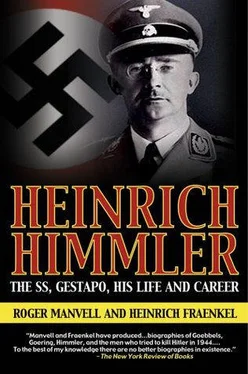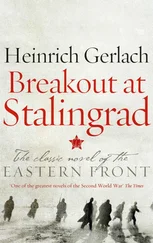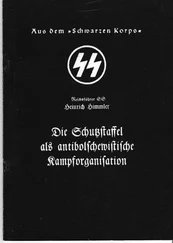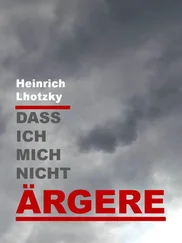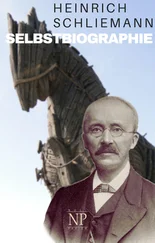The final stage in the modification of Himmler’s power did not come until the summer of 1936. This was preceded by the legal recognition of the Gestapo in a Prussian statute of 10 February in which a clause was inserted that no judicial appeal could be instituted against any decision made by the Gestapo; its activities were absolute. By a succession of decrees starting on 17 June, Himmler was, as we have seen, made Chief of the German Police, an office still separate from that of the Reichsführer S.S. 17
Himmler celebrated his new appointment with an odd ceremonial on 2 July at which he commemorated the thousandth anniversary of the death of Heinrich I, the protagonist of German expansion in the East. This took place at Quedlinburg, a town in the region of the Harz mountains which had been founded by Heinrich.
In his speech about one of the ‘greatest Germans ever’, as Gunther d’Alquen called him in a glowing description of the event, Himmler praised the ‘clever, cautious, tenacious politician’ in terms he felt also suited himself. He used the occasion to attack the influence of the Church in German history; Heinrich, he said, had refused to allow the Church to interfere in State affairs. According to Himmler, this Saxon Duke known as Henry the Fowler, who became the founder of the German state, ‘never forgot that the strength of the German people lies in the purity of their blood’. 18
In an article published in the same year, Himmler impressed once again on readers, whom he addressed as fellow peasants, that the precious heritage of blood in the German race must be maintained by force:
‘I, as Reichsführer S.S., who am myself a peasant according to ancestry, blood and being, would like to state this second fact to you, the German peasants: the idea of blood, advocated by the S.S. from the beginning, would be condemned if it were not eternally bound to the value and the holiness of the soil.’
The S.S. themselves, he wrote, stood side by side with the German peasant stock, and were ceaselessly vigilant to protect the noble German blood:
‘I know that there are some people in Germany who become sick when they see these black uniforms; we understand the reason for this and do not expect we shall be loved by all that number of people; those who come to fear us, in any way or at any time, must have a bad conscience toward the Führer and the nation. For these persons we have established an organisation called the Security Service… Without pity we shall wield a merciless sword of justice…
‘Each one of us knows he does not stand alone, but that this tremendous force of 200,000 men, who are bound together by oath, gives him immeasurable strength… We assemble and march according to unalterable laws as a National Socialist military order of prominently Nordic men, and as a sworn community on our way into a far future,… ancestors of later generations, and necessary for the eternal life of the Germanic people.’
Himmler’s immersion in the past did not limit his interest in the future. He always urged his S.S. men to procreate in order to increase the number of pure-blooded German stock in Europe. This advice culminated in Himmler’s celebrated edict published in October 1939, in which he exhorted the S.S. to conceive children before going into battle. He watched the S.S. birthrate most carefully, but statistics for August 1936 which have been preserved show that the average size for S.S. families at that time was only between one and two children. At the same time, Himmler was determined to take care of the mothers of illegitimate children provided both they and their babies met the required racial standards.
In 1936 the S.S. became the sponsor of the Lebensborn (Fount of Life) maternity homes, in which Himmler took great pride and which, as innumerable surviving records show, he supervised personally down to the last detail. In taking responsibility for the welfare of these young Germans, the S.S. ensured that they were suitably indoctrinated from the very start of their education, and every man had to contribute to the maintenance of these homes with deductions from his pay, the main burden being borne by bachelors. 19
Himmler was true to his own teaching. Conscious, no doubt, that many people thought his own appearance remarkably ‘un-Aryan’, he ordered elaborate researches to be undertaken into his ancestry. The files of memoranda on this subject still exist, and they continue well into the period of the war; the centre for this research was at Wewelsburg, from which statements supplemented by elaborate genealogical forms would arrive as each stage of the investigation back to the eighteenth century was gradually completed. Similar research was undertaken into the ancestry of Marga Himmler. As soon as Himmler’s interest became known, namesakes would write to him begging to be acknowledged as kinsmen of the Reichsführer S.S.
Himmler, an addict to detail, spent time in his office poring over letters and memoranda all concerned with proving the purity of his blood and that of his family, his staff and the men under his command. The surviving documentation on all this research, which represented years of painstaking work by large numbers of genealogists and clerks, and in many cases bitter heart-searching by those unable to prove their ancestry to be free of defilement, amounted to thousands of items in the bursting files of undestroyed Nazi history. After the war had already begun, Himmler intervened personally to reprimand an S.S. man who had accepted refreshments from the father of a Jew he was escorting from a concentration camp, and in April 1940 he sent a long letter of sympathy to another S.S. man at the front who had put on paper the terrible shock he received when he had discovered he possessed Jewish blood. He wrote antedating ancestral purity by a further century:
‘I can so well imagine your position and your feelings. So far as our blood is concerned, I have stipulated that the end of the Thirty Years War (1648) is to be the day to which each of us is obliged to make sure of his ancestry. Should there be some Jewish blood after that date a man must leave the S.S… . In telling you all this I hope that you will understand the great sacrifice I have to impose on you… In your heart of hearts you still belong to us, you can still feel you are an S.S. man.’
Himmler softens the blow he so sympathetically deals by adding that if the man were to die at the front, the S.S. will look after his wife and children.
During the war Himmler formed a permanent association with a girl called Hedwig who was his personal secretary and by whom in 1942 and 1944 he had two further children, Helge, a son, and Nanette Dorothea, a daughter. Hedwig was the daughter of a regular soldier, who had been at the time of her birth in 1912 a sergeant-major in the German Army. In 1936 she was awarded the standard sports certificate, the Deutsches Sportabzeichen, for her achievements in swimming, running and jumping. Nevertheless, researches into her ‘Aryan’ ancestry were initiated and continued into the years of the war. 20
In spite of the fact that in 1937 Himmler solemnly went through the routine of qualifying for his own S.S. sports badge, forcing his inadequate body to run and to jump until he was persuaded by his adjutants that he had reached the necessary standards, his health was far from good. 21He had been suffering from acute headaches for some years, and his congenitally weak constitution produced stomachcramps, the intensity of which was increased by nervous tension resulting from continued worry over his responsibilities. He feared he might be developing cancer, the disease from which his father died. 22It was Wolff who, knowing his suspicion of orthodox treatment, persuaded him in 1934 to undergo massage, and Franz Setzkorn, a nature healer, was called in to soothe away the pain. It was not until 1939 that a man was found who was able to bring more lasting relief to the strained nerves which made Himmler’s stomach twist with cramp and his head feel like a ball of fire. This was Felix Kersten, the cosmopolitan Finnish masseur whose second home before the war was in Holland. Kersten’s reputation for alleviating nervous pains had enabled him to maintain a lucrative practice in Berlin, near to which he had bought a country estate in 1934 called Hartzwalde. At this stage, however, they had not met.
Читать дальше
